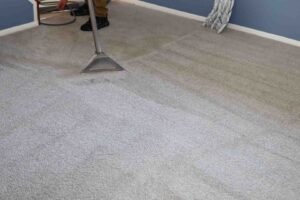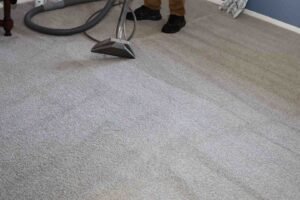Why Carpet Cleaning Home Remedies Are Worth Knowing
Carpet cleaning home remedies are an accessible, affordable way to tackle everyday spills using common household ingredients. Knowing a few simple solutions for coffee spills, pet accidents, or muddy footprints can save you time and money while keeping your carpets fresh.
Quick Home Remedies for Common Carpet Stains:
| Stain Type | Remedy | Method |
|---|---|---|
| Pet Stains/Odors | White vinegar + water (1:2 ratio) | Spray, let sit, blot dry |
| Grease/Oil | Baking soda or cornstarch | Sprinkle, wait 15-20 min, vacuum |
| Red Wine | Salt or club soda | Cover immediately, blot after 10-15 min |
| Coffee/Tea | Hydrogen peroxide (3%) + dish soap | Mix 2 tbsp peroxide + 1 tbsp soap, apply, rinse |
| General Cleaning | Vinegar + water + baking soda | Combine 2 cups each vinegar/water + 2 tbsp baking soda |
Homemade solutions are simple and highly cost-effective. A DIY carpet cleaning solution for machines costs about $1 per gallon, while commercial formulas can be as much as $19.59. Natural ingredients like vinegar, baking soda, and hydrogen peroxide work by breaking down stains, absorbing odors, and lifting dirt without harsh chemicals.
For busy Grove City residents, having these remedies on hand allows for immediate action before a spill sets. Acting quickly is crucial, as the faster you treat a stain, the less likely it is to become permanent.
However, DIY methods are best for fresh stains and routine maintenance. Deep-set stains, large affected areas, or delicate carpet fibers often require professional attention to avoid damage.
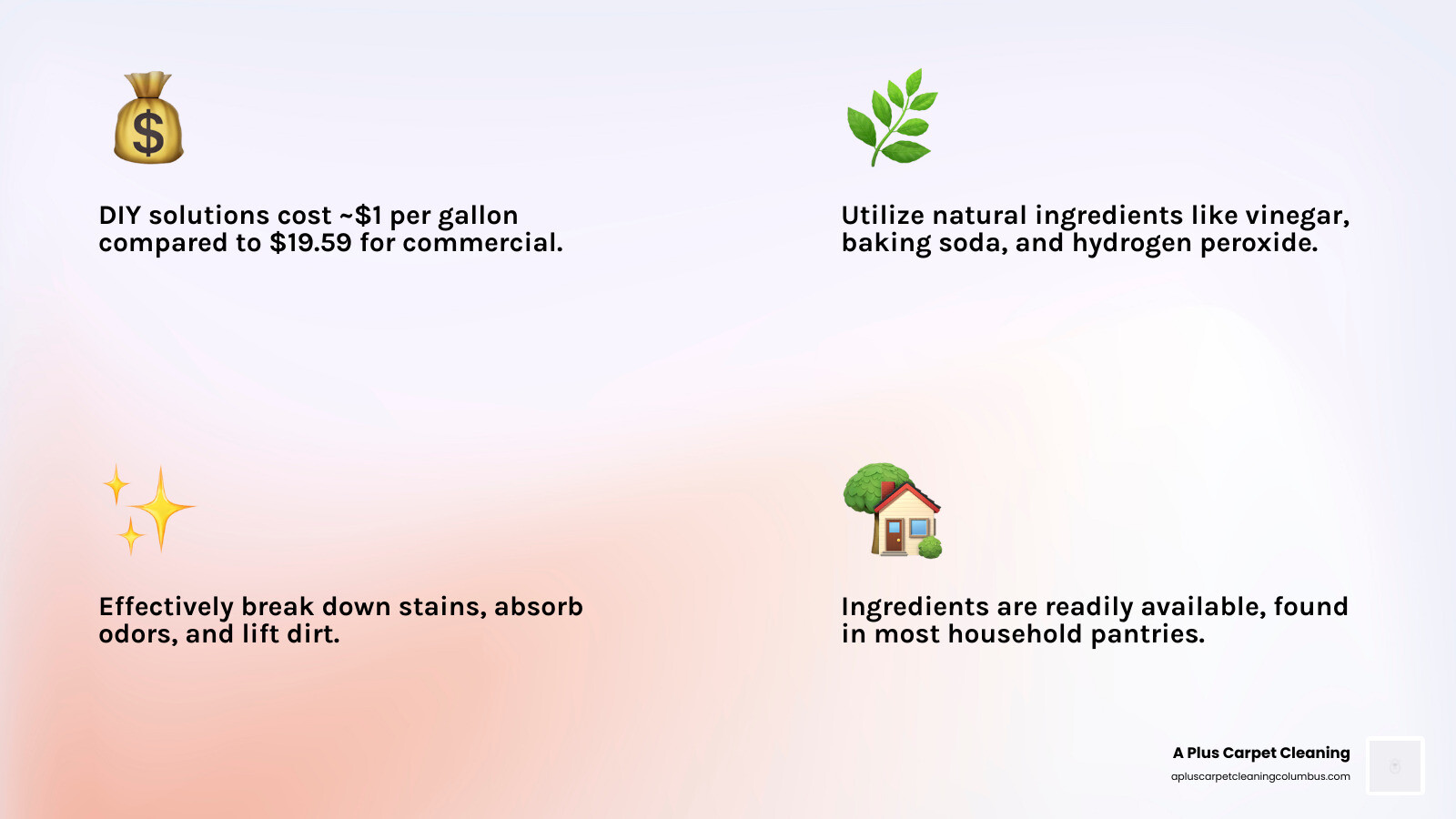
Top Carpet Cleaning Home Remedies for Every Stain
Most common carpet mishaps can be handled with cleaning powerhouses already in your kitchen, saving you from buying expensive commercial products.
The Power of Pantry Staples: Vinegar, Baking Soda, and Salt
White vinegar, baking soda, and table salt are an impressive arsenal against stains and odors.
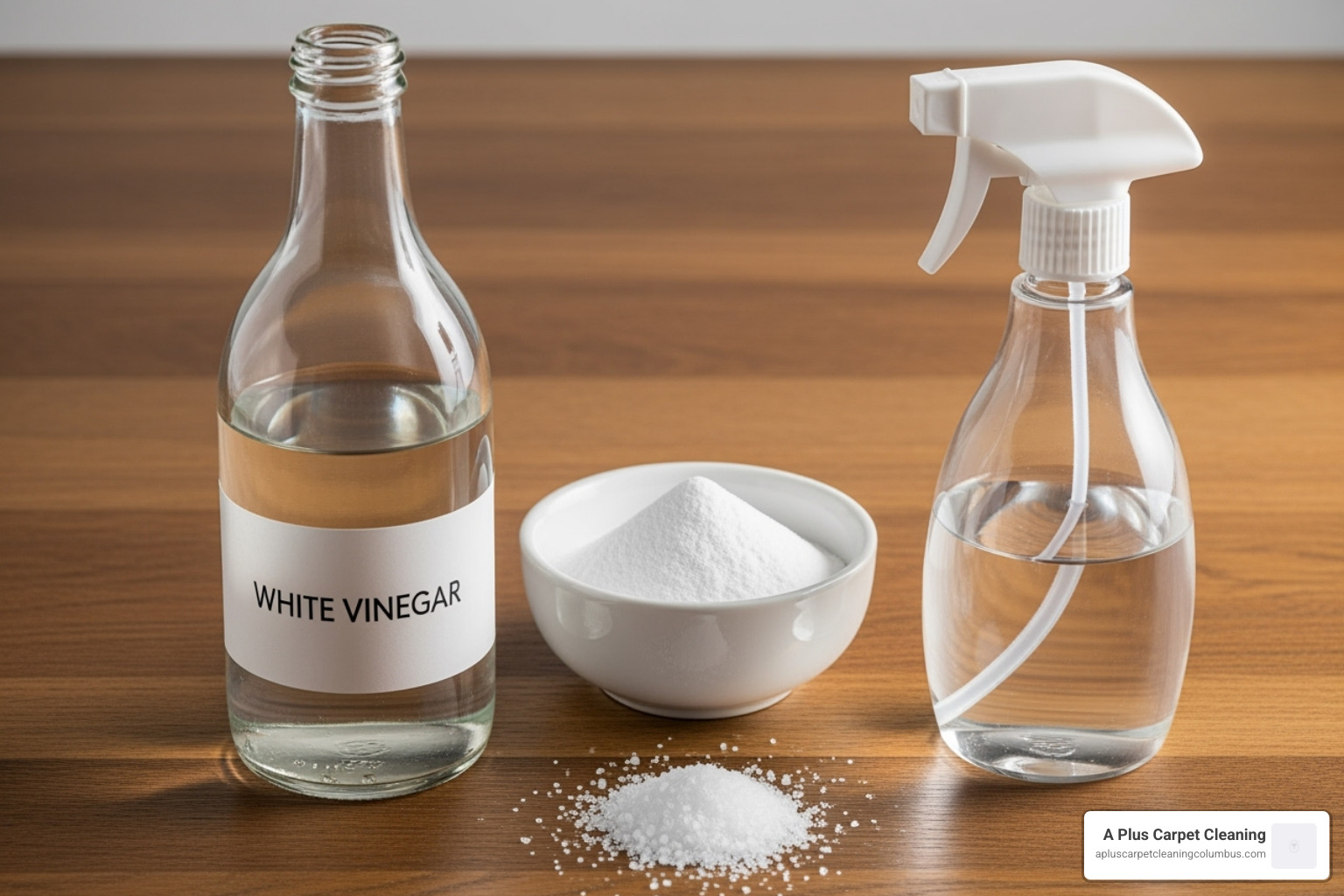
White vinegar’s acetic acid breaks down stains and neutralizes odors. For a versatile spot cleaner, mix 1/4 cup white vinegar with one tablespoon of dish soap and water in a spray bottle. This simple solution is great for everyday spills. For more eco-friendly ideas, see our guide on green cleaning.
Baking soda absorbs odors and moisture from deep within carpet fibers. For a quick refresh, sprinkle it lightly over your carpet, let it sit for 15 minutes, and vacuum. For tougher odors, leave it on overnight to absorb more.
Salt is crucial for protein-based stains like blood or dairy. Create a paste by combining 1/4 cup table salt, 1/4 cup white vinegar, and 1/4 cup borax powder. Apply this to the stain, let it dry for 24 hours, then vacuum. Follow with a water rinse and blot thoroughly to lift the stain and eliminate the odor.
Creating a Solution for Your Carpet Cleaning Machine
If you own or rent a carpet cleaning machine, you can make your own effective cleaning solution for a fraction of the cost of store-bought versions. A homemade solution costs about $1 per gallon, while commercial formulas can run $19.59 for just half a gallon.
Here’s a recipe that works in most machines:
- Start with 3.75 liters of hot water (or room temperature if your machine heats it).
- Add 1/4 cup of 3% hydrogen peroxide to break down stains.
- Mix in 2 tablespoons of white vinegar to neutralize odors.
- Add just 1 tablespoon of dish soap for cleaning power without sticky residue.
Gently combine the ingredients in a 4-liter jug, avoiding vigorous shaking to prevent excess bubbles. Before using, check your machine’s warranty, as some manufacturers specify certain cleaners. For more tips, visit our deep cleaning guide.
A Guide to Spot-Cleaning Common Carpet Stains
The secret to winning the battle against stains is acting fast. Remember the golden rule: always blot, never rub. Rubbing spreads the stain and can damage carpet fibers. Use a clean white cloth and blot from the outer edges inward.
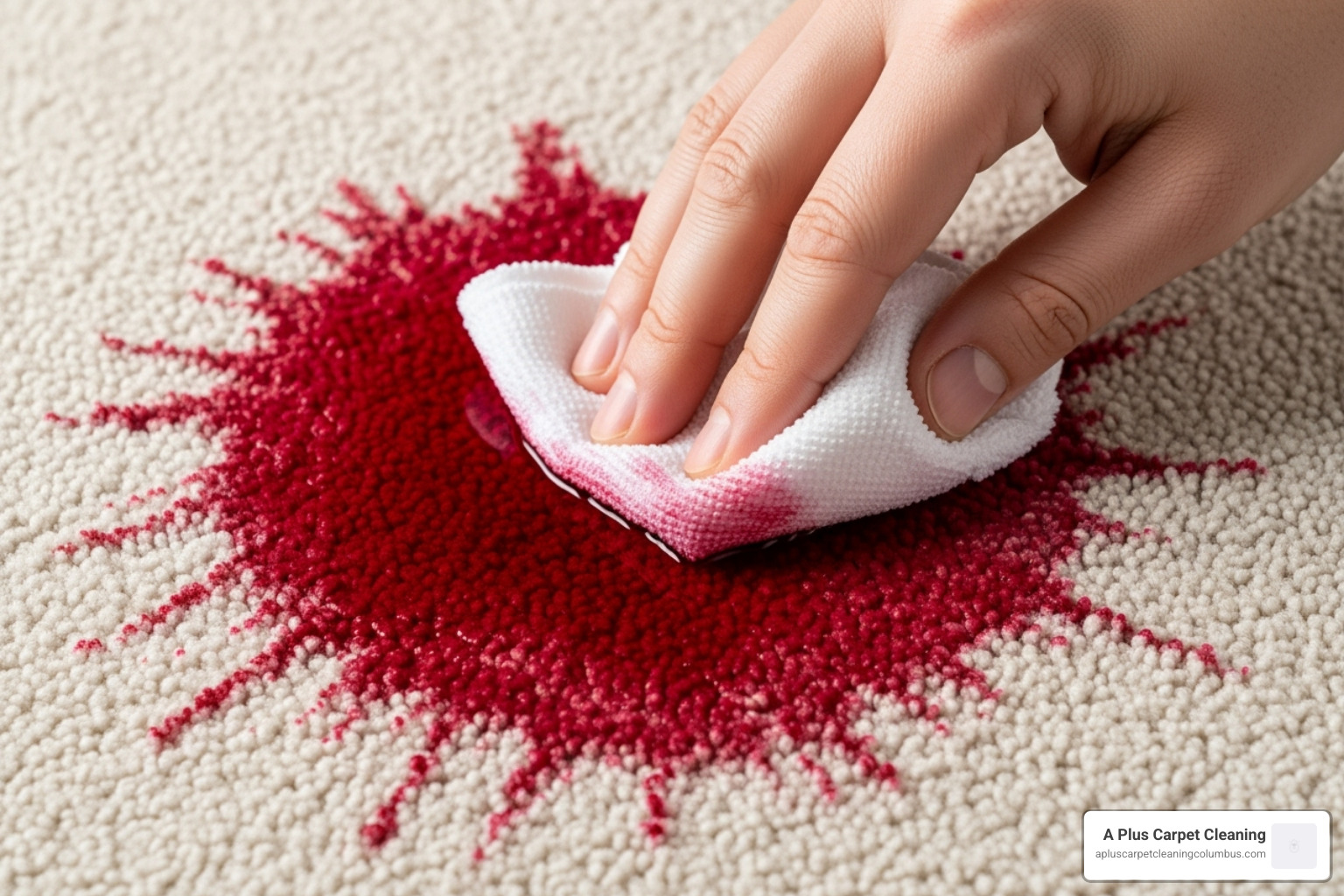
-
Pet stains and odors: Blot up as much liquid as possible. An enzymatic cleaner is best for breaking down organic compounds. If you don’t have one, spray a mix of one part white vinegar to two parts water, let it sit, and blot dry to neutralize the smell. For more strategies, see our pet stain removal guide.
-
Grease and oil stains: Sprinkle a mix of equal parts baking soda and cornstarch over the stain. Let it sit for 15-20 minutes to absorb the grease, then vacuum. Alternatively, spray rubbing alcohol on the stain, rub gently with a bar of natural soap, and blot with a damp cloth.
-
Red wine spills: Act fast. Blot immediately, then cover the spill with table salt for 10-15 minutes to absorb the wine. You can also spray the area with club soda and dab with a clean cloth. For tougher stains, apply a mix of 2 tablespoons of 3% hydrogen peroxide and 1 tablespoon of dish soap, let it sit briefly, then rinse and blot.
-
Coffee and tea stains: After blotting, apply a solution of 2 tablespoons of 3% hydrogen peroxide and 1 tablespoon of dish soap. Let it sit for a few seconds, gently work it in, then rinse with water and blot thoroughly.
Application and Drying Tips for Carpet Cleaning Home Remedies
For the best results, follow these steps:
-
Always spot test first. Before treating a stain, apply your solution to a hidden area (like inside a closet) to check for colorfastness. This prevents turning a small spot into a large, discolored patch.
-
Blot, don’t rub. As COO of The Cleaning Authority Leanne Stapf notes, rubbing can spread a stain or push it deeper. Use a clean white cloth with gentle pressure, working from the outside in.
-
Know how long to leave solutions. Dwell time varies. Baking soda needs 15 minutes for light odors or overnight for tough ones. Peroxide solutions need only a few seconds to 10 minutes. Pastes for protein stains should dry completely (up to 24 hours) before vacuuming.
-
Rinse away residue. Leftover cleaning solution attracts dirt. After treating a stain, lightly spray the area with clean water and blot with a dry cloth to remove any film, especially from dish soap.
-
Ensure proper drying. To prevent mold, mildew, and watermarks, blot the area with dry towels. Use fans and open windows to increase airflow across the cleaned spot. Allow the carpet to dry completely before walking on it. For more advice, explore our carpet washing guide.
When to Use Home Remedies vs. Calling a Professional
While carpet cleaning home remedies are valuable for everyday spills, they can’t solve every problem. Knowing when to use a DIY solution versus calling a professional is key to protecting your carpet investment.
Weighing the Pros and Cons of DIY Carpet Cleaning Home Remedies
DIY carpet cleaning has its time and place, but it’s important to recognize its limitations.
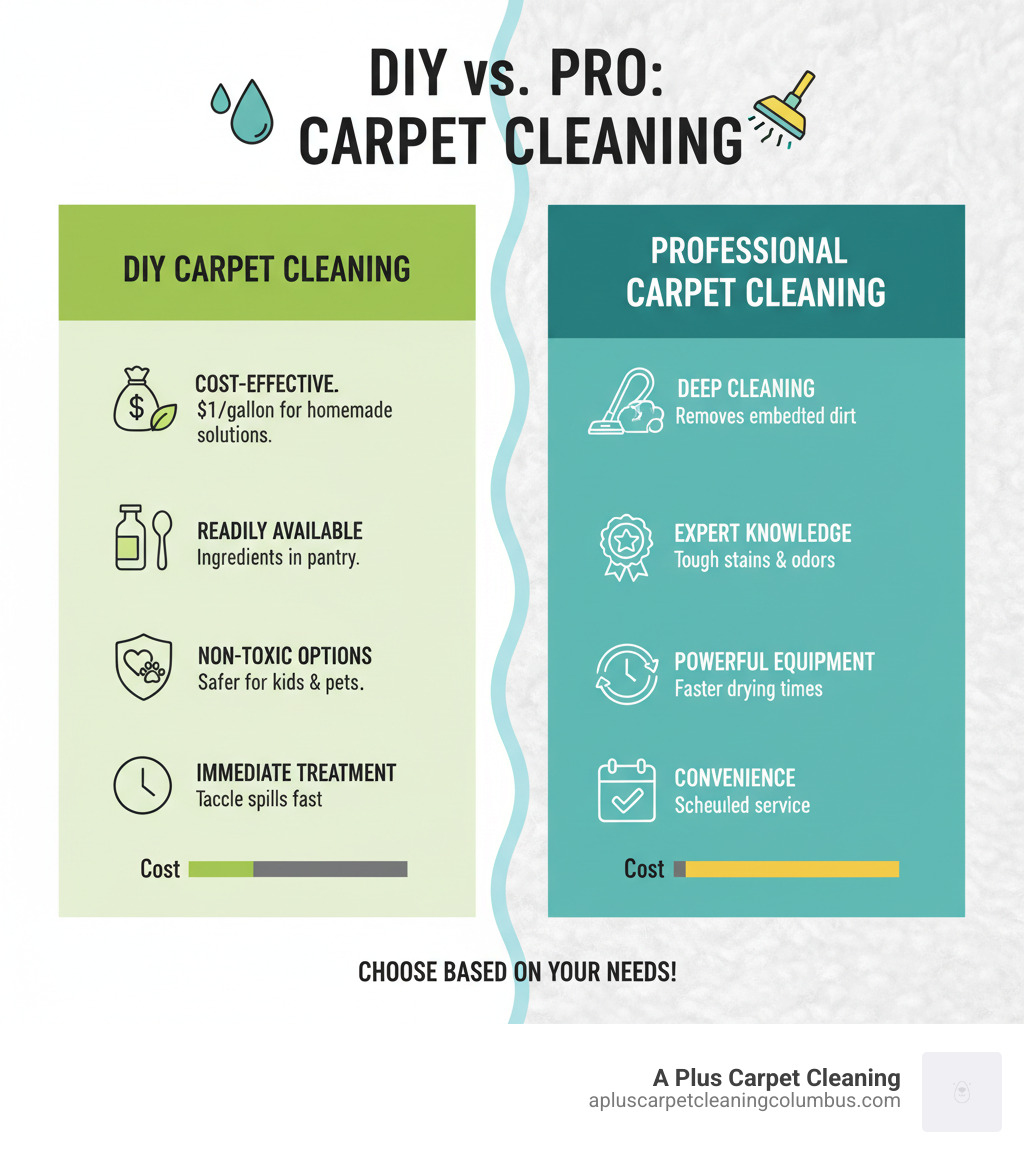
Pros of DIY: The main advantages are cost and convenience. Using inexpensive pantry staples allows you to treat spills immediately before they set. Plus, you avoid the harsh chemicals found in many commercial products, which is better for families and pets. For more ideas, check out How to Make a DIY Carpet Cleaner and Stain Remover Using Simple Household Ingredients.
Cons of DIY: Home remedies often fail on old or deep-set stains that have bonded with carpet fibers. It’s also easy to over-saturate the carpet without professional extraction equipment, leading to mold and mildew growth in the padding. Certain ingredients, like high-concentration hydrogen peroxide, can bleach carpets, while natural fibers like wool or silk can be easily damaged by the wrong solution. Finally, cleaning large areas by hand is time-consuming, and leftover residue can attract more dirt.
Knowing Your Limits: When DIY Isn’t Enough
Sometimes, the smartest and most cost-effective decision is to recognize when a problem requires professional help.
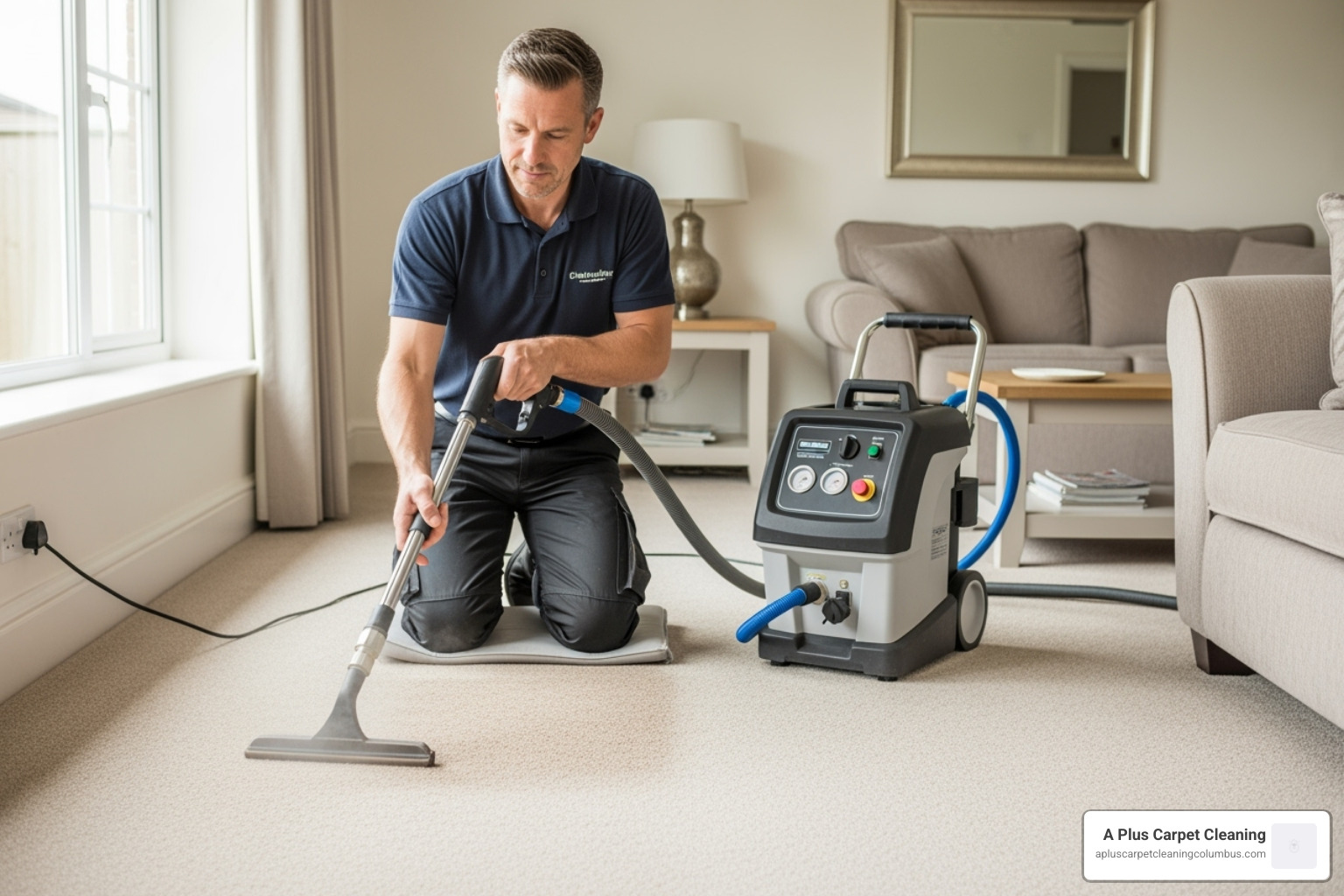
Call a professional for:
- Deep-set or old stains: Stains that have bonded with carpet fibers over time require professional equipment that uses heat, pressure, and stronger solutions for effective extraction.
- Large stained areas: Cleaning large sections by hand is impractical and often yields uneven results. Professionals can ensure uniform cleaning and proper drying.
- Delicate carpet fibers: Natural materials like wool, silk, or jute are sensitive and can be permanently damaged by incorrect DIY methods. Experts know how to identify and safely treat them.
- Water damage: Significant water exposure from floods or burst pipes requires industrial extraction and antimicrobial treatments to prevent mold and structural issues.
- Persistent odors: Lingering smells, especially from pet accidents that have soaked into the padding, need professional-grade enzymatic treatments and deep extraction to be fully eliminated.
Carpet manufacturers recommend professional deep cleaning every 12 to 18 months to remove embedded soil and allergens, which extends your carpet’s life and improves indoor air quality.
At A Plus Carpet Cleaning in Grove City, Ohio, our trained technicians serve New Albany, Upper Arlington, Plain City, Hilliard, Dublin, Columbus, Westerville, Powell, Worthington, and surrounding areas. We use state-of-the-art equipment to tackle what DIY methods can’t, eliminating risks of over-saturation or fiber damage. For help choosing a service, see our tips on hiring professionals.
Ready to give your carpets the deep clean they deserve? Book your professional carpet cleaning service today and enjoy fresh carpets without the guesswork.


